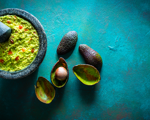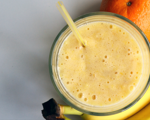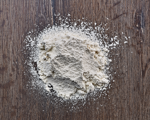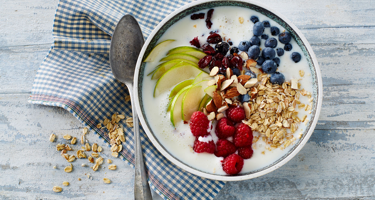
As the name implies, plant-based protein derives from plant sources rather than animals. The latter is known as animal protein. Protein from plant sources often also contains, for example, fibres, vitamins, and minerals.
What are plant-based protein sources?
Plant-based proteins are protein sources derived from plants rather than animals. Plant-based protein sources are available from a wide variety of foods. These sources range from legumes and nuts to whole grains and products derived from soy. They often serve as the backbone of plant-based diets.
If you want to know more about plant-based protein foods, read our articles on top 15 high-protein vegetables and Protein in fruits.
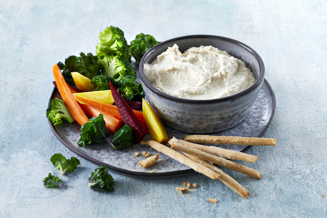
A list of plant-based protein sources
Below we have listed four plant-based protein types and go into details about the protein content of some specific foods within each category.
1) Legumes
The legume family consists of beans, lentils, and peas. Legumes are high in fibre and protein. For instance, boiled kidney beans contain 6.1 grams of protein per 100 grams, equalling 26.3 % of the total energy value. Dried lenses hold 26.2 grams of protein per 100 grams, which is 30.4 % of the total energy value, and raw green peas contain 5.9 grams of protein per 100 grams, which is about 34 %.
Legumes also go well in many dishes, so they are easy to incorporate into your everyday cooking.
2) Nuts and seeds
In the domain of nuts and seeds, almonds, walnuts, chia seeds, flax seeds, and hemp seeds are at the top of the list.
- The protein content of almonds is 21.2 grams per 100 grams, corresponding to 14.4 % of the total energy value.
- Walnuts contain 14.1 grams of protein per 100 grams, equalling 8.3 % of the total energy value.
- Chia seeds contain 18.2 grams, equalling 16.3 % of total energy value.
- And flax seeds contain 25 grams per 100 grams, equalling about 22 % of total energy value.
They can all be sprinkled on salads, yoghurts, or smoothies for added protein and texture.
3) Grains
Grains might not be the first food category that comes to mind when you think of plant-based protein, but certain whole grains, like quinoa and oats, pack a decent amount of protein.
- Quinoa contains about 12 grams of protein per 100 grams, which leaves the protein content just below 14 % of the total energy value. This value varies a bit depending on which type of quinoa you choose.
- Oats contain about 13.3 grams of protein per 100 grams, meaning that the energy contribution of protein is 14.7 % of the total value.
4) Soy products
Turning our attention to soy products, we find tofu, tempeh, and edamame, all of which are derived from the soybean. These products are not only sources of protein but also contain a variety of other nutrients.
- Tofu is incredibly versatile and can be used in everything from stir-fries to smoothies, offering approximately 13.3 grams of protein per 100 grams, meaning that 43 % of the total energy value of tofu comes from protein.
- Edamame beans are a bit lower with 10.7 grams of protein per 100 grams and 33.3 % of total energy value.
Both easily make the cut for being placed in the category of high-protein foods, as this requires that at least 20 % of the total energy comes from protein.
Plant protein versus whey protein
Whey protein is one of the two major proteins found in milk (the other being casein) and is a so-called complete protein. The major difference between whey and plant protein lies in the additional nutrients they bring. Whey contains lactose and may not be suitable for those with lactose intolerance or sensitivity.
Plant-based protein versus animal protein
Like whey protein, animal protein, which includes meat, fish, dairy, and eggs, is also a complete protein. As mentioned previously, most plant proteins are incomplete, but they can be combined to form a meal with complete protein.
Which plant-based drink has the most protein?
Regarding plant-based drinks, soy drink tops the list in protein content with about 3.3-3.7 grams per 100 grams and an energy contribution above 40 %. Read more about protein in milk and plant-based drinks here.
Other plant-based drinks, like almond, rice, and oat drink, typically have less protein, sometimes even less than 1 gram per 100 grams. It is important to note that the nutritional content can vary depending on the brand, so it is always a good idea to check the product label.
Related Articles
Want to understand different types of protein? Here's everything you need to know:















